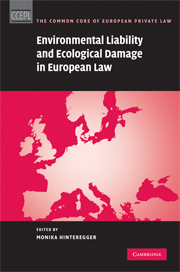Book contents
- Frontmatter
- Contents
- Preface
- Acknowledgments
- General editors' preface
- Notes on the contributors
- Table of treaties
- Table of legislation
- List of abbreviations
- Part I Environmental liability in Europe
- 1 International and supranational systems of environmental liability in Europe
- 2 Some observations on the law applicable to transfrontier environmental damage
- Part II The case studies
- Part A Scope of liable persons
- Part B Causation and multiple tortfeasors
- Part C Remedies and legal standing
- Part III Comparison, summary and conclusions
- Bibliography
- Index
1 - International and supranational systems of environmental liability in Europe
from Part I - Environmental liability in Europe
Published online by Cambridge University Press: 23 July 2009
- Frontmatter
- Contents
- Preface
- Acknowledgments
- General editors' preface
- Notes on the contributors
- Table of treaties
- Table of legislation
- List of abbreviations
- Part I Environmental liability in Europe
- 1 International and supranational systems of environmental liability in Europe
- 2 Some observations on the law applicable to transfrontier environmental damage
- Part II The case studies
- Part A Scope of liable persons
- Part B Causation and multiple tortfeasors
- Part C Remedies and legal standing
- Part III Comparison, summary and conclusions
- Bibliography
- Index
Summary
General systems of environmental liability
Lugano Convention
In 1993, at Lugano, the Council of Europe passed the Convention on Civil Liability for Damage Resulting from Activities Dangerous to the Environment. The Lugano Convention, which also covers risks with respect to gene technology, has been open to accession since 21 June 1993, though it has not yet entered into force. So far, only nine states (Cyprus, Finland, Greece, Iceland, Italy, Liechtenstein, Luxembourg, Portugal and the Netherlands) have signed the Convention, but no state has yet ratified it.
The Lugano Convention provides for strict liability for damage caused by activities dangerous to the environment, including activities conducted by public authorities. It covers the environmental risks of dangerous substances, genetically modified organisms, dangerous micro-organisms and waste. ‘Dangerous substances’ are defined according to various EC Directives cited in Annex I to the Convention. With regard to waste, the Convention covers installations or sites for the incineration, treatment, handling or recycling of waste (further specified in its Annex II) and sites for the permanent deposit of waste. Liability is imposed on the operator of the activity, who is defined as the person exercising control over a dangerous activity (Article 2 § 5). A ‘person’ under the Convention means any individual or partnership or body governed by private or public law, whether corporate or not, including a state or any of its constituent subdivisions (Article 2 § 6). The operator is allowed to escape liability under various defences (Article 8), including contributory negligence (Article 9).
- Type
- Chapter
- Information
- Publisher: Cambridge University PressPrint publication year: 2008
- 1
- Cited by

